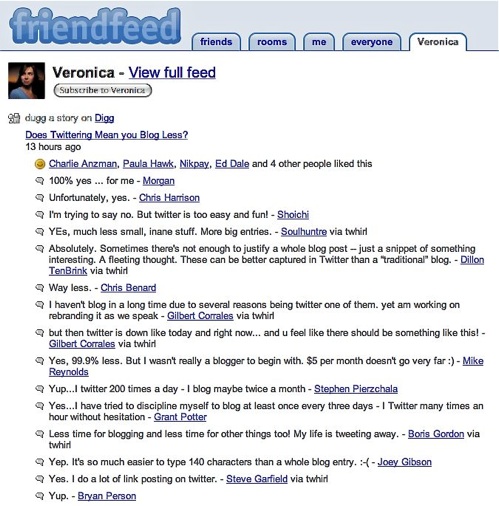A question keeps popping up for me: is "micro" blogging (as in Twittering) affecting "macro" blogging (as in what you’re looking at here)? I say it definitely is slowing down the frequency of regular blogging, because people are just spending so much time on Twitter — well, the rabid early adopters, anyway. But many of these happen to be long-time bloggers, too. So, Twitter’s bound to have an effect on how often they blog. I also touched on this in a post a few weeks ago: Blogging Less, Twittering More.
But then I saw a discussion on FriendFeed a few days ago, which you see here in the graphic. [Okay, it took me a few days to post it because I was Twittering….and FriendFeeding.] 
The comments to this post certainly tell the tale, confirming my own suspicions. By the way, I don’t know any of these people, including the poster, Veronica — but, yes, through the magic of Web 2.0, they’re all my "friends" now… 🙂
The original blog post that Veronica dugg on Digg was this one from Ryan Block, the editor-in-chief of Engadget: Does Twittering Mean You Blog Less?
By the way, if you want to keep up with me on Twitter, just go here and follow me: www.twitter.com/graemethickins. And to subscribe to my FriendFeed, go here: http://friendfeed.com/graemethickins. There quite a discussion now going on amongst the digerati as to whether FriendFeed will overtake Twitter, with all the downtime and scaling problems the latter is having. I even questioned in a recent tweet whether FriendFeed might be bought by Google (which would be interesting, since it was founded by ex-Googlers).
What do you think? Do you like one over the other? Have you even tried either one? Does any of this matter, or it is all just about the kool kids trying to find the next fad?



Recent Comments